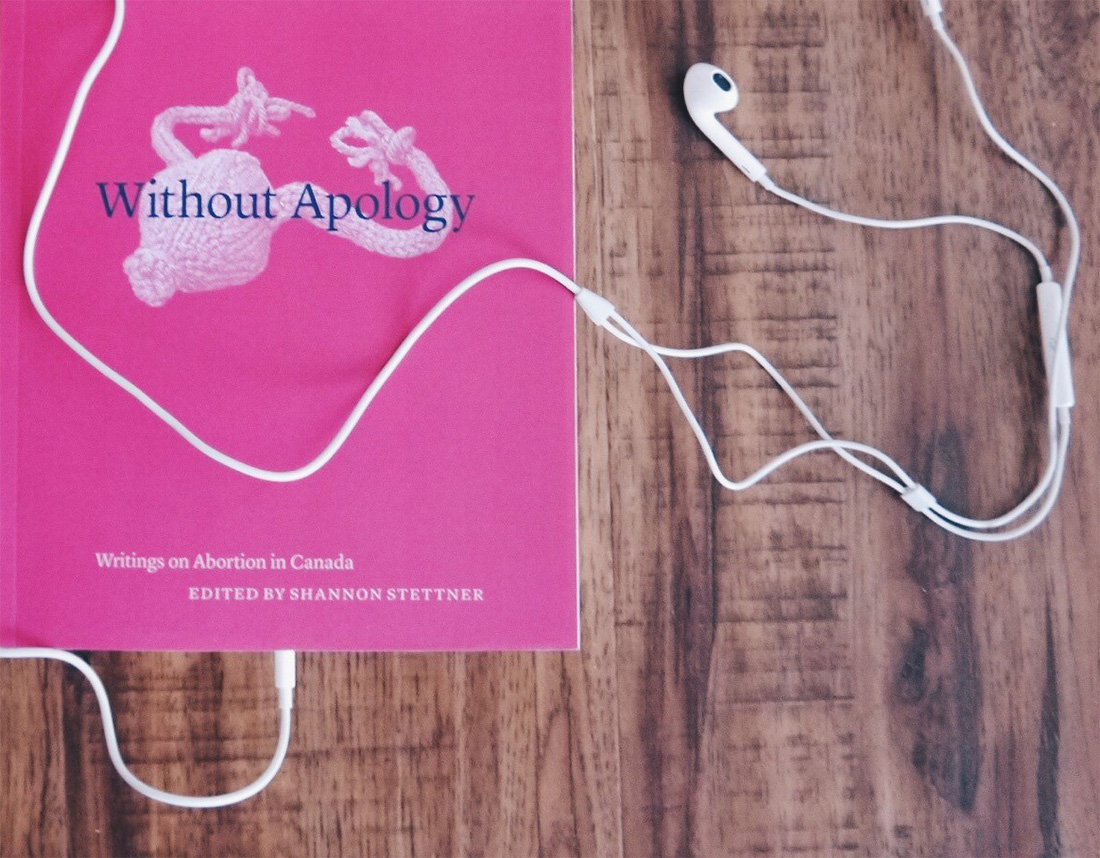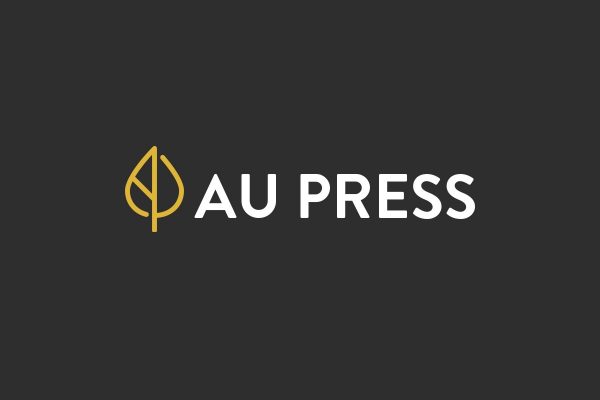Here it is. The first instalment of Open Book Bites, the audio portion of the Open Book Blog. Episode 1 is a casual conversation with Shannon Stettner, editor of Without Apology: Writings on Abortion in Canada. Shannon was in Edmonton for the History of Women’s Social & Political Activism in the Canadian West Conference where she spoke about the historic Abortion Caravan and how we negotiate activist identities. We’d like to thank Shannon for taking the time to answer our questions and we’d also like to thank A/B Trio for providing the intro music. Visit our website for more information about Without Apology or to download your free copy.
Transcript
Hello and welcome to the AU Press Open Book Blog, where we take you beyond the book. Today, we’re sitting down with the editor of our latest edited collection, Without Apology: Writings on Abortion in Canada.
Shannon Stettner teaches in the Women’s Studies department at the University of Waterloo. She is also the co-founder of the Reproductive Activism and Abortion Research Network.
Today, she’s joining us from the University of Alberta where she’s speaking at the History of Women’s Social & Political Activism in the Canadian West Conference. We sat down to talk about her book and some of the recent reproductive justice issues in Canada and across the globe.
MH: Thanks for coming to speak with me, Shannon.
SS: Thank you for having me.
MH: It’s a nice chance to get to know you a little better given that I’m in Edmonton and you’re in Toronto. Your book collects the voices of women whose lives have been touched by abortion. So we’ve got chapters by activists, feminists, scholars, abortion providers, clinic staff, and women whose experience with abortion is far more personal. And I’m wondering what prompted you to collect these stories into this book and what kind of perspectives did you really want to hear from?
SS: There are a lot of different impulses behind the call for papers that went out. One is, as a historian, I like to hear stories, people’s stories, people’s personal experiences. I think we learn a lot from that in the study of history, certainly I have in studying women’s abortion experiences in the 60s. And so I wanted to create a space where women who have had abortions can share their experiences. Although we have books and narratives from earlier periods, we don’t have as many contemporary works on abortion. I also think it’s important that as a movement we continually have conversations about the issues that are important to us and the language that we use to describe those issues.
I thought it was really a good moment to reflect on what was happening with the movement especially as we are beginning to see the use of more reproductive justice frameworks and activists coming into Canada or influencing Canadians. That kind of opens up some new avenues for discussion and certainly there have been some law changes over the last few years. All of this together made for a really good time to revisit abortion in Canada.
MH: I was wondering a little bit more about why you chose to include perspectives from abortion providers—clinic support staff and doctors—because that’s a perspective we haven’t heard from very often.
SS: Right, it isn’t a perspective we hear from very often. What we hear a lot about in historical accounts, of say abortion law reform, is what doctors were saying but we don’t hear much about how doctors interact with their patients as providers or clinic members for that matter—counsellors and support staff. I think that they provide a really important and unique perspective because they see the women who are, if not in a moment of crisis, at an anxious moment perhaps. And so their perspective is a little bit different and then also too if there’s follow-up, then they see the women after the procedures have been done and so can give us a sense of how women process through that. This also raises the issue of how women respond to the anti-abortion harassment that they face when they go to the clinics. And so that was an important angle to bring in as well.
MH: And that was one aspect that you and I were talking about with the RU-486 [Mifegymiso] and the bringing in of that legislation that will probably make the pill available in November in some shape or form—seems like there’s still some debate as to how it will be regulated but I think we were talking about how it will transform our perception of abortion, if the women don’t have to pass through those picket lines in order to receive this kind of a pill, if their GP can prescribe it…
SS: Right, if we can get Health Canada to remove some of the current restrictions that they’re trying to place on the dispensing of the pill then the pill has a real potential to change the abortion experience—at least for a lot of women who are having earlier abortions. Women will get to choose the location at which they’re having the abortion which might mean having an abortion at home which increases privacy, increases comfort. It means not having to confront protestors or hospital members who might be working in a termination unit but who may not be in favour of abortion. It means controlling the timing of it. When you think about the barriers to abortion, things like women needing time off work, women needing to find childcare, women needing to have people available to transport them or have money for transportation. Being able to have an abortion at home, removes some of those barriers and that is an amazing accomplishment.
MH: I think those are all interesting perspectives on the RU-486 and how we’ll see that affect the way we talk about abortion in the future and the way we see it. I’m wondering what your impression was of what happened recently in Poland—the tens of thousands of people coming out to actively discuss their concerns about the criminalization of women and the banning of abortion. How can or how should Canadian abortion activists respond to these international events?
SS: The movements for abortion rights are transnational movements in that there is a sharing of ideas and strategies. But I also think that they have to figure out a way to challenge the laws that is specific and organic to their culture and their history. We can be inspired by and we can inspire these women. We can offer support but really it’s the women and their allies on the ground who have to be the ones who challenge the abortion laws. And if you look at the case of Prince Edward Island in Canada, there was no access to abortion in PEI for many years and ultimately that changed because the women in PEI said “enough.” They came together in a grassroots movement that was very specific to the culture of the island and that’s what they needed. We’re tremendously thrilled that they have accomplished what they have accomplished and we’re inspired by them but it really is, it really has to be an organic movement.
MH: I think that’s an excellent point and something I hadn’t really thought of—exporting your own understanding of the movement onto another region or country.
After the completion of this project and the publication of the book, is there something that still stands out to you—either a quote or a particular chapter or contribution, or even a personal exchange that you had with one of your chapter authors that is, you know, ringing true to you these days or has held a lot of meaning for you.
SS: The thing that I like about this book, a lot, is that every time I read it, a different chapter speaks to me so my favourites sort of rotate. And I think that depends on what else I’ve been reading or thinking about. I like the book because I’m always discovering or re-discovering a piece and I think that’s really exciting and fun to be able to take something new each time you read it. There are lots of chapters, especially in the personal narratives that have exquisite phrasing or feelings or insights. In the chapter by E.K. Hornbeck, for example, she’s talking about the nurses who work in the pregnancy termination unit at the hospital and she calls them the “guardian angels” of the women who are there that day having abortions because their family and friends aren’t able to be present. She just felt a tremendous amount of support and I think it’s nice to recognize the kind of support care that is specific to goes into abortion nursing.
There’s a line in Erin Mullan’s piece where she mentions that oftentimes, as an abortion counsellor, she is the only person who will hear a woman’s abortion story. I think that’s kind of heartbreaking. Some women will only tell their story to one person in their lifetime but how tremendously remarkable is it that we have these fantastic women like Erin Mullan and Ruth Miller who are there to hear their stories. Those are touching pieces.
There are also pieces in the collection that challenge us. Several people have commented on—and probably the piece that has had the biggest impact on how I think about abortion—is Laura Gillespie’s piece which challenges us to reclaim or take a more active role in defining how we use the language around abortion. She does this by discussing the term pro-abortion. That’s a really powerful piece because for a long time this has been a very loaded term and as I said that one has had a big impact on my thinking of abortion.
And I wanted to also mention Jane Cawthorne’s piece because in it she reminds us that we have to hold the media accountable for the continued or ongoing debates around abortion. I think that’s really true—we know that since the late 1960s, the majority of Canadians have supported a woman’s right to choose. Public opinion poll after public opinion poll confirms this and yet the media still insists on treating this as an equal issue and giving equal time to both those who are in support of women’s rights to access an abortion and those who are against abortion. And so as far as I’m concerned, the media is in part responsible for this continuing to be an issue. I think that we let the media off the hook too much and that we need to start holding them accountable for prolonging the discussion when it really doesn’t need to be.
MH: Well, thank you very much for joining us today to talk. I think this gives the book another perspective and a voice.
SS: Thank you for having me.
<Transcript was edited for clarity>


